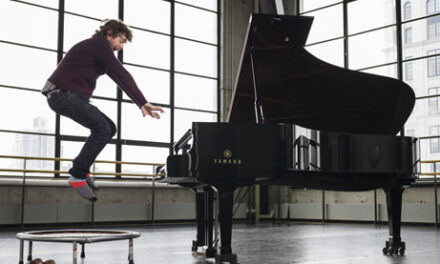The Music House, a private concert venue in Greenville, continues to maintain a very important calendar of serious music, on a level that is big-city, both in terms how many performances are put on and the extremely high quality of the venue and the musicians. Impresario John O’Brien loves music and loves sharing it with the community.
The latest triumph was Thomas Otten and Marc Callahan‘s presentation of Franz Schubert’s Die Winterreise.
Schubert, called a “tubby little mushroom” by his friends, led a pretty miserable life. He spent a lot of it working at what he considered a hack job, teaching children music. He was rejected as Kapellmeister at Laibach and as a member of the Gesellschaft der Musikfreunde. Apparently, he was not allowed to marry the only woman he proposed to because he could not demonstrate an ability to support her. (He was only 17.) He was supported much of his life by his friends. He died when he was only 31, after tormenting illnesses: typhoid, syphilis, mercury poisoning – take your pick. Nevertheless, he was a prolific, if not obsessive composer. Music flowed out of his pen; frequently he seemed to have no idea that it would ever be published or performed – and still he wrote. There is not the same jollity in Schubert that there is even in the most tragic of Bach or Handel. Schubert is brooding and dark and often hard to listen to. O’Brien hinted at this in some of his earlier promotions of the Winterreise, but such proved not to be the case.
Callahan and Otten produced a delightful performance of this tragic song cycle. To set the Music House scene, Otten and Callahan were both informally dressed all in black. Corrupted by Anna Russell, one sometimes expects opera singers all to look like Little Billy Bunion; quite to the contrary, Callahan relaxed us all by his open collar and half-rolled-up sleeves, and his easy-going but serious stage presence. I arrived early for the performance, and while enjoying a glass of wine and a pimiento-cheese rollup or two in the dining room, I could hear the two performers warming up. Even from two rooms away the piano playing was first rate and Callahan’s voice was exciting.
Die Winterreise is a setting of two sets of twelve songs by Wilhelm Müller; It was presented as one long cycle without intermission. Although the German libretto was not available, a very literal English translation was projected verse by verse on a screen at the front of the music room, making it easy for anyone with a little German (this reviewer, anyway) to grasp what was being sung.
Otten, whose piano part was fully equal in gravitas and complexity to the vocal line, played from a score. He was playing the Music House 1887 Model C Steinway; Otten’s control of the modern piano was characterized by great control and a complete communion of spirit with the singer. In No. 2, “Der Wetterfahne”(The Weathervane), No. 5, “Der Lindenbaum” (The Linden), and No. 13, “Die Post” (The Mail), Schubert provided Otten with some especially nice opportunities for solo tone painting that were deliciously performed.
Callahan sang entirely from memory – an impressive feat in itself. His interpretive gestures were very graceful and relaxed; they were big contributions to his performance. His voice was warm and full. Although he is an opera singer, his delivery was in no way operatic – not forced, harsh, or stylized, even when fortissimo. In No. 3, “Gefror’ne Träne” (Frozen Tears), Callahan’s lament over the tears frozen to his face was poignantly gentle. No. 4, “Erstarrung” (Numbness) was as well controlled a piece of singing as I have ever heard. In No. 11, “Frühlingstraum” (A Dream of Springtime), Callahan delivered this beautiful German in a very natural voice. In No. 23, “Die Nebbensonnen” (The Phantom Suns), with its clearly expressed death wish, Callahan avoided any absurdly white-hot passion, choosing instead to sing with a sad beauty.
Otten and Callahan will perform Die Winterreise on February 26 in Winston-Salem and on March 5 in Chapel Hill. This is a fantastic pair of performers, and this is a much nicer piece of Schubert than is suggested by its reputation – perhaps this is attributable to Callahan and Otten. At any rate, it is not to be missed.
For information on the upcoming performances by the duo, see our calendar.











